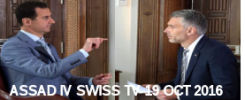 During an interview on 19 October 2016 with Swiss TV SRF 1 TV Live, President Bashar al-Assad stressed that protecting civilians in Aleppo necessitates getting rid of the terrorists. He said, “Of course, it’s our mission according to the constitution and the law. We have to protect the people, and we have to get rid of those terrorists in Aleppo. That’s how we can protect civilians.” He added that it goes without saying that the way to protect the civilians in Aleppo is to attack the terrorists who hold the civilians under their control and are killing them. Full transcript inside:
During an interview on 19 October 2016 with Swiss TV SRF 1 TV Live, President Bashar al-Assad stressed that protecting civilians in Aleppo necessitates getting rid of the terrorists. He said, “Of course, it’s our mission according to the constitution and the law. We have to protect the people, and we have to get rid of those terrorists in Aleppo. That’s how we can protect civilians.” He added that it goes without saying that the way to protect the civilians in Aleppo is to attack the terrorists who hold the civilians under their control and are killing them. Full transcript inside:
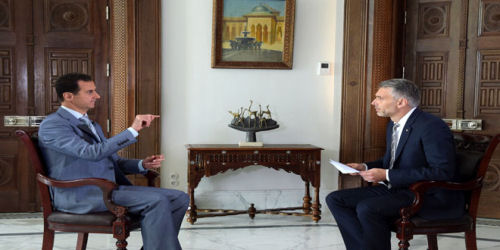
President al-Assad to Swiss SRF 1 TV channel: Fighting terrorists is the way to protect civilians in Aleppo
Following is the full text of the interview:
Journalist: Mr. President, thank you very much for having welcomed Swiss Television and our program Rundschau here in Damascus.
President Assad: You are most welcome in Syria.
Question 1: First, please, allow me to clarify one thing: may I ask you every question?
President Assad: Every question, without exception.
Question 2: I’m asking because one of your conditions is that interview is being broadcast in its full version. Are you afraid that we might manipulate your statements?
President Assad: You should answer that question, but I think we should build this relation upon the trust, and I think you are worried about the trust of your audience, so I don’t think so. I think you have good reputation in conveying the truth in every subject you try to cover.
Question 3: Do you see it as a lie, that the world considers you as to be a war criminal?
President Assad: That depends on what the reference in defining that word. Is it the international law, or is it the Western agenda or the Western political mood, let’s say, that’s being defined by vested-interests politicians in the West? According to the international law, as a President and as government and as Syrian Army, we are defending our country against the terrorists that have been invading Syria as proxies to other countries. So, if you want to go back to that word, the “war criminal,” I think the first one who should be tried under that title are the Western officials; starting with George Bush who invaded Iraq without any mandate from the Security Council. Second, Cameron and Sarkozy who invaded and destroyed Libya without mandate from the Security Council. Third, the Western officials who are supporting the terrorists during the last five years in Syria, either by providing them with political umbrella, or supporting them directly with armaments, or implementing embargo on the Syrian people that has led to the killing of thousands of Syrian civilians.
Question 4: But we are here to talk about your role in this war, and the US
Secretary of State John Kerry called you “Adolf Hitler” and “Saddam Hussein” in the same breath. Does it bother you?
President Assad: No, because they don’t have credibility. This is first of all. Second, for me as President, what I care about first and foremost is how the Syrian people look at me; second, my friends around the world – not my personal friends as President, I mean our friends as Syrians, like Russia, like Iran, like China, like the rest of the world – not the West, the West always tried to personalize things, just to cover the real goals which is about deposing government and getting rid of a certain president just to bring puppets to suit their agenda. So, going back to the beginning, no I don’t care about what Kerry said, at all. It has no influence on me.
Question 5: You’re the President of a country whose citizens are fleeing, half of your fellow citizens. The people are not only fleeing because of the terrorists, of ISIS, or the rebels, but also because of you.
President Assad: What do you mean by me? I’m not asking people to leave Syria, I’m not attacking people; I’m defending the people. Actually, the people are leaving Syria for two reasons: first reason is the action of the terrorists, direct action in killing the people. The second one is the action of the terrorists in order to paralyze the life in Syria; attacking schools, destroying infrastructure in every sector. Third, the embargo of the West that pressed many Syrians to find their livelihood outside Syria. These are the main reasons. If you can see that the second factor and the third factor are related, I mean the role of the terrorists and the West in undermining and hurting the livelihoods of the Syrians, is one and, let’s say, is commonality between the terrorists and Europe.
Question 6: When you speak of terrorists, who do you mean by that? Surely ISIS, but also the “Free Syrian Army” or the Kurds?
President Assad: What I mean is like what you mean as a Swiss citizen, if you have anyone who carries machineguns or armaments and killing people under any titles, and committed vandalism, destroying public or private properties; this is a terrorist. Anyone who adopts a political way in order to make any change he wants, this is not a terrorist. You can call him opposition. But you cannot call somebody who is killing people or holding armaments, you cannot call him opposition, in your country, in my country as well.
Question 7: Well, you don’t have any free opposition in your country.
President Assad: Of course we have, of course we have. We have real opposition, we have people who live in Syria, whom their grassroots are the Syrian people, they’re not opposition who were forged in other countries like France or UK or Saudi Arabia or Turkey. We have them, and you can go and meet them and deal with them with your camera. You can do that yourself.
Question 8: How do you explain to your three children what is happening in
Aleppo? I’m sure that you are discussing about it at the family table.
President Assad: Yeah, of course if I’m going to explain to them, I’m going to explain about what is happening in Syria, not only in Aleppo, taking into consideration that my children are full-grown now, they understand what is going on Syria. But if you want to explain to them or to any other child what is happening, I’m going to explain about the role of the terrorists, about the role of Qatar, Turkey, Saudi Arabia in supporting those terrorists with money, with logistic support, and the role of the West in supporting those terrorists either through armament or through helping them with the propaganda and the publicity. I’m going to explain to them in full what’s going on.
Question 9: Do you, as a father, also say that you have nothing to do with the bombardments of the hospitals in Aleppo?
President Assad: Look, when they say that we are bombarding the hospitals, it means that we are killing civilians. That is the meaning of the word. The question is why would the government kill civilians, whether in hospitals or in streets or schools or anywhere? You are talking about killing Syrians. When we kill Syrians, as a government, or as army, the biggest part of the Syrian society will be against us. You cannot succeed in your war if you are killing civilians. So, this story, and this narrative, is a mendacious narrative, to be frank with you. Of course, unfortunately, every war is a bad war, in every war you have innocent victims, whether children, women, elderly, any other civilian, any other innocent who is not part of this war, he could pay the price, this is unfortunately. That’s why we have to fight terrorism. When we don’t say that, it’s like saying – according to that question or that narrative, that you may reflect in your question – that the terrorists, Al Qaeda, al-Nusra, ISIS, are protecting the civilians, and we as government are killing the civilians. Who can believe that story? No one.
Question 10: But who else got airplanes or bunker-busting bombs besides your army?
President Assad: It’s like you’re saying that everyone who is killed in Syria was killed by the airplanes or aircrafts, military aircrafts! The majority of the people were killed by mortars shelled by the terrorists on them while they’re at schools, in their hospitals, in the streets, anywhere. It’s not related to the aerial bombardment. Sometimes you have aerial bombardment against the terrorists, but that doesn’t mean that every bomb that fell somewhere was by airplane or by the Syrian Army. If you are talking about a specific incident, let’s say, we have to verify that specific incident, but I’m answering you in general now.
Question 11: But you have the power to change the situation also for the children in Aleppo.
President Assad: Of course, that’s why-
Journalist: Will you do that?
President Assad: Exactly, that’s our mission, according to the constitution, according to the law; that we have to protect the people, that we have to get rid of those terrorists from Aleppo. This is where we can protect the civilians. How can you protect them while they are under the control of the terrorists? They’ve been killed by them, and they’ve been controlled fully by the terrorists. Is it our role to sit aside and watch? Is that how we can protect the Syrian people? We need to attack the terrorists, that’s self-evident.
Question 12: May I show you a picture?
President Assad: Of course.
Journalist: This young boy has become the symbol of the war. I think that you know this picture.
President Assad: Of course I saw it.
Journalist: His name is Omran. Five years old.
President Assad: Yeah.
Journalist: Covered with blood, scared, traumatized. Is there anything you would like to say to Omran and his family?
President Assad: There’s something I would like to say to you first of all, because I want you to go back after my interview, and go to the internet to see the same picture of the same child, with his sister, both were rescued by what they call them in the West “White Helmets” which is a facelift of al-Nusra in Aleppo. They were rescued twice, each one in a different incident, and just as part of the publicity of those White Helmets. None of these incidents were true. You can have it manipulated, and it is manipulated. I’m going to send you those two pictures, and they are on the internet, just to see that this is a forged picture, not a real one. We have real pictures of children being harmed, but this one in specific is a forged one.
Question 13: But it’s true that innocent civilians are dying, in Aleppo.
President Assad: Of course, not only in Aleppo; in Syria. But now you are talking about Aleppo, because the whole hysteria in the West about Aleppo, for one reason; not because Aleppo is under siege, because Aleppo has been under siege for the last four years by the terrorists, and we haven’t heard a question by Western journalists about what’s happening in
Aleppo that time, and we haven’t heard a single statement by Western officials regarding the children of Aleppo. Now, they are talking about Aleppo recently just because the terrorists are in a bad shape. This is the only reason, because the Syrian Army are making advancement, and the Western countries – mainly the United States and its allies like UK and France – feeling that they are losing the last cards of terrorism in Syria, and the main bastion of that terrorism today is Aleppo.
Question 14: Everything is allowed in this war for you.
President Assad: No, of course, you have the international law, you have the human rights charter, you have to obey. But in every war, every war in the world during the history, you cannot make sure a hundred percent that you can control everything in that direction. You always have flaws, that’s why I said every war is a bad war. But there’s difference between individual mistakes and the policy of the government. The policy of the government, to say that we are attacking civilians, we are attacking hospitals, we are attacking schools, we are doing all these atrocities, that’s not possible, because you cannot work or go against your interests. You cannot go against your duty toward the people, otherwise you are going to lose the war as a government. You cannot withstand such a ferocious war for five years and a half while you are killing your own people. That’s impossible. But you always have mistakes, whether it’s about crossfire, it’s about individual mistakes… bring me a war, a single war in the recent history, that it was a clean war. You don’t have.
Question 15: Do you have made any mistakes too in this war?
President Assad: As President I define the policy of the country, according to our policy, the main pillars of this policy during the crisis is to fight terrorism, which I think is correct and we will not going to change it, of course, to make dialogue between the Syrians, and I think which is correct, the third one which is proven to be effective during the last two years is the reconciliations; local reconciliations with the militants who have been holding machineguns against the people and against the government and against the army, and this one has, again, proven that it’s a good step. So, these are the pillars of this policy. You cannot talk about mistakes in this policy. You can talk about mistakes in the implementation of the policy, that could be related to the individuals.
Question 16: You still believe in a diplomatic solution?
President Assad: Definitely, but you don’t have something called diplomatic solution or military solution; you have solution, but every conflict has many aspects, one of them is the security, like our situation, and the other one is in the political aspect of this solution. For example, if you ask me about how can you deal with Al Qaeda, with al-Nusra, with ISIS? Is it possible to make negotiations with them? They won’t make, they’re not ready to, they wouldn’t. They have their own ideology, repugnant ideology, so you cannot make political solution with this party; you have to fight them, you have to get rid of them. While if you talk about dialogue, you can make dialogue with two entities; the first one, political entities, any political entities, whether with or against or in the middle, and with every militant who is ready to give in his armament for the sake of the security or stability in Syria. Of course we believe in it.
Question 17: There are news from Russia about a short humanitarian pause in Aleppo on Thursday, what does it mean this humanitarian pause, can you explain?
President Assad: It’s a short halting of operations in order to allow the humanitarian supply to get into different areas in Aleppo, and at the same time to allow the civilians who wanted to leave the terrorist-held areas to move to the government-controlled area.
Question 18: This is really a step, an important step?
President Assad: Of course, it is an important step as a beginning, but it’s not enough. It’s about the continuation; how can you allow those civilians to leave. The majority of them wanted to leave the area held by the terrorists, but they won’t allow them. They either shoot them or they kill their families if they leave that area.
Question 19: Russia is on your side, what does it mean for you?
President Assad: No, it’s not on my side. It’s on the international law’s side.
It’s on the other side which is opposite to the terrorists’ side. This is the position of Russia, because they wanted to make sure that the international law prevails, not the Western agenda in toppling every government that doesn’t fit with their agendas. They wanted to make sure that the terrorism doesn’t prevail in that area, that would affect negatively the Russians themselves, Russia itself as a country, and Europe and the rest of the world. That’s what it means for Russia to stand beside the legitimate Syrian government and the Syrian people.
Question 20: Mr. President, you use chemical weapons and barrel bombs in Syria against your own population, these are UN reports, you can’t ignore it.
President Assad: You are talking about two different issues. The chemical issue, it was proven to be false, and they haven’t a shred of evidence about the Syrian Army using chemical weapons, particularly before we give up our arsenal in 2013, now we don’t have it anyway. Before that, it was fiction because if you want to use such mass destruction armaments, you’re going to kill thousands of people in one incident, and we didn’t have such incidents. Beside that, we wouldn’t use it because you’re going to kill your own people, and that’s against your interest. So, this is a false allegation. We don’t have to waste our time with it. You live in Syria, there is a traditional war, but there is nothing related to mass destruction armaments.
Journalist: But the UN report is not a fiction.
President Assad: The UN report never has been credible, never, and because they put reports based on allegations, based on other reports, on forged reports, and they say this is a report. Did they send a delegation to make investigation? They sent one in 2013, and it couldn’t prove at all that the Syrian Army used chemical weapons. This is first. The second, which is more important, the first incident happened at the beginning of 2013 in
Aleppo, when we said that the terrorists used chemical weapons against our army, and we invited the United Nations to send a delegation. We, we did, and at that time, the United States opposed that delegation because they already knew that this investigation – of course if it’s impartial – is going to prove that those terrorists, their proxies, used chemical armaments against the Syrian Army. Regarding the barrel bombs, I want to ask you: what is the definition of barrel bomb? If you go to our army, you don’t have in our records something called “barrel bomb,” so how do you understand – just to know how I can answer you – what a barrel bomb is? We have bombs.
Journalist: The destruction… it’s the destruction, and it is against humanitarian law.
President Assad: Every bomb can make destruction, every bomb, so you don’t have bomb to make nothing. So, this is a word that has been used in West as part of the Western narrative in order to show that there is an indiscriminate bomb that has been killing civilians indiscriminately and that opposes the Western narrative, I’ll show you the contradiction: in other areas they say that we are bombarding intentionally the hospitals, and you mentioned that, and they are targeting intentionally the schools, and we targeted intentionally the convoys to Aleppo last month, those targets need high-precision missiles. So, they have to choose which part of the narrative; we either have indiscriminate bombs or we have high-precision bombs. They keep contradicting in the same narrative, this is the Western reality now. So, which one to choose? I can answer you, but again, we don’t have any indiscriminate bombs. If we kill people indiscriminately, it means we are losing the war because people will be against us; I cannot kill the Syrian people, either morally or for my interest, because in that case I’m going to push the Syrian community and society towards the terrorists, not vice versa.
Question 21: I would like to mention the subject of torture prisons, Mr. President. Amnesty speaks of seventeen thousands dead. Regarding the prison of Saidnaya, there are still horrible reports. When will you allow an independent observer into that prison?
President Assad: Independent, and Amnesty International is not independent and it is not impartial.
Journalist: ICRC?
President Assad: We didn’t discuss it with the Red Cross, we didn’t discuss it. It should be discussed in our institutions, if you want to allow… if there is allegation, it could be discussed. We don’t say yes or no, but the report you have mentioned, it was a report made by Qatar, and financed by Qatar. You don’t know the source, you don’t know the names of those victims, nothing verified about that report. It was paid by Qatar directly in order to vilify and smear the Syrian government and the Syrian Army.
Journalist: But there are a lot of eyewitnesses.
President Assad: No one knows who are they. You don’t have anything clear about that. It’s not verified. So, no.
Journalist: Then open the door for organizations like Red Cross.
President Assad: It’s not my decision to tell you yes or no. We have institutions, if we need to discuss this part, we need to go back to the institutions before saying yes or no.
Question 22: Why are you sure that you are going to win this war?
President Assad: Because you have to defend your country, and you have to believe that you can win the war to defend your country. If you don’t have that belief, you will lose. You know, part of the war is what you believe in, so, it’s self-evident and very intuitive that you have to have that belief.
Question 23: If you walk through Damascus, your picture is everywhere, in every shop, in every restaurant, in every car, a symbol for a dictator, is this your way to fix your power?
President Assad: There is a difference between dictator and dictatorship.
Dictator is about the person. I didn’t ask anyone to put my picture in Syria, I never did it. This is first. Second, to describe someone as a dictator, you should ask his people, I mean only his people can say that he is a dictator or he is a good guy.
Journalist: Thank you Mr. President for having answered our questions for Swiss Television and the Rundschau.
President Assad: Thank you for coming to Syria.
Source of transcript: Syrian Arab Newsagency
 After fruitless and protracted negotiations between the Human Social Justice Union and Mother Nature, U.N. mediator Hoo R.U. Kiddun has booked off. His decision came after the HSJU reps and Mother Nature failed to hammer out a deal in the latest of enumerable all-night bargaining sessions. “The parties are just too far apart”, Kiddun remarked, “To come to an agreement, there has to be some give and take on both sides, but it seems that for 250 years Union members have been doing all the taking and Management refuses to continue giving.”
After fruitless and protracted negotiations between the Human Social Justice Union and Mother Nature, U.N. mediator Hoo R.U. Kiddun has booked off. His decision came after the HSJU reps and Mother Nature failed to hammer out a deal in the latest of enumerable all-night bargaining sessions. “The parties are just too far apart”, Kiddun remarked, “To come to an agreement, there has to be some give and take on both sides, but it seems that for 250 years Union members have been doing all the taking and Management refuses to continue giving.”


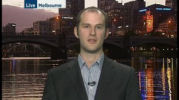
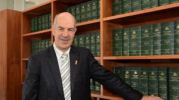
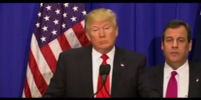 In this video, Trump repeatedly denounces and denies KKK endorsement, as he is asked again and again, day after day, in a demonstration of truly absurd press behaviour. The KKK leader, David Duke, also states here that he never endorsed Trump. Despite the slurs, Donald Trump has denounced KKK hate groups and not said anything racist or bigoted. Yet Whoopi Goldberg, political opponents and main stream media types continue to perpetuate the lie.
In this video, Trump repeatedly denounces and denies KKK endorsement, as he is asked again and again, day after day, in a demonstration of truly absurd press behaviour. The KKK leader, David Duke, also states here that he never endorsed Trump. Despite the slurs, Donald Trump has denounced KKK hate groups and not said anything racist or bigoted. Yet Whoopi Goldberg, political opponents and main stream media types continue to perpetuate the lie. 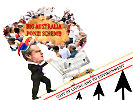 "Strong population growth is boosting aggregate demand and therefore the growth rate of the economy. But measures of per capita outcomes are more sobering and suggest that not enough emphasis is being placed on them in the policy debate. A brief look at income per capita, dwelling prices to income, infrastructure spend per capita and traffic congestion points to the need for a comprehensive and open discussion around the policy direction Australia is taking. ... The pressures of very high immigration are contributing to social, environmental and economic stress in Australia. There appears to be a tri-party (coalition, Labor and Greens) agreement to keep this off the agenda, despite high levels of public concern."
"Strong population growth is boosting aggregate demand and therefore the growth rate of the economy. But measures of per capita outcomes are more sobering and suggest that not enough emphasis is being placed on them in the policy debate. A brief look at income per capita, dwelling prices to income, infrastructure spend per capita and traffic congestion points to the need for a comprehensive and open discussion around the policy direction Australia is taking. ... The pressures of very high immigration are contributing to social, environmental and economic stress in Australia. There appears to be a tri-party (coalition, Labor and Greens) agreement to keep this off the agenda, despite high levels of public concern." 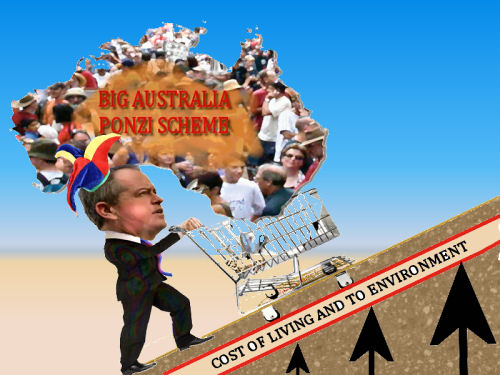
 "Mark, I am fully aware that your job must be challenging and frustrating at times, but ignoring the elephant in the room – the increasingly obvious negative impacts of population growth - is putting EV and all who care for our environment on a never ending hamster wheel of frustration, disappointment, and ultimately hard earned campaign money down the gurgler. Unchecked population growth is having a ratchet effect, steadily increasing the pressure on the environment and reversing previous efforts to protect it. " (Jenny Warfe)
"Mark, I am fully aware that your job must be challenging and frustrating at times, but ignoring the elephant in the room – the increasingly obvious negative impacts of population growth - is putting EV and all who care for our environment on a never ending hamster wheel of frustration, disappointment, and ultimately hard earned campaign money down the gurgler. Unchecked population growth is having a ratchet effect, steadily increasing the pressure on the environment and reversing previous efforts to protect it. " (Jenny Warfe)
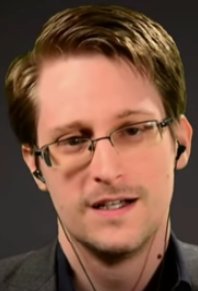
 As the title suggests, this article argues, using six examples, that the left treated Hillary Clinton's war plans against Russia as a non-issue. The article begins with six numbered headings and follows with the correspondingly numbered reasons, using arguments from emails, interviews and other documents. The article also discusses the influence of the Trotskyists in riots against Trump.
As the title suggests, this article argues, using six examples, that the left treated Hillary Clinton's war plans against Russia as a non-issue. The article begins with six numbered headings and follows with the correspondingly numbered reasons, using arguments from emails, interviews and other documents. The article also discusses the influence of the Trotskyists in riots against Trump.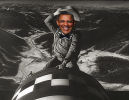 Francis A. Boyle, Gadaffi's international lawyer and author of
Francis A. Boyle, Gadaffi's international lawyer and author of  Australian Wildlife Protection Council asks Mornington Peninsula Council to investigate potential breaches at 461-469 Waterfall Gully Rd and also to ensure that important remnant vegetation and heritage listed trees are better protected from property development. At the very least Council should ensure planning applications that are granted to remove indigenous vegetation are required to have wildlife spotters on site and flora professionals the opportunity to collect seed and plant material for environmental revegetation projects.
Australian Wildlife Protection Council asks Mornington Peninsula Council to investigate potential breaches at 461-469 Waterfall Gully Rd and also to ensure that important remnant vegetation and heritage listed trees are better protected from property development. At the very least Council should ensure planning applications that are granted to remove indigenous vegetation are required to have wildlife spotters on site and flora professionals the opportunity to collect seed and plant material for environmental revegetation projects.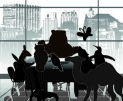 I’m not a vegan or even a vegetarian. I guess you could call me a reasonably discerning but practical omnivore but I’m becoming rather desperate to find something I can eat without feeling guilty about the harm I am doing to someone, something or to the environment.
I’m not a vegan or even a vegetarian. I guess you could call me a reasonably discerning but practical omnivore but I’m becoming rather desperate to find something I can eat without feeling guilty about the harm I am doing to someone, something or to the environment.
 Lest we forget the profiteers whose patriotism and bank balances were always beyond question. At the going down of the sun – we will remember them. [Editor's note: The inclusion of various politicians in the illustrations was an editor idea, not the poet's.]
Lest we forget the profiteers whose patriotism and bank balances were always beyond question. At the going down of the sun – we will remember them. [Editor's note: The inclusion of various politicians in the illustrations was an editor idea, not the poet's.]
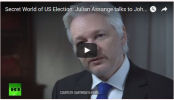
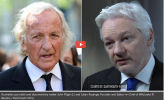 It is Mrs Hillary Clinton who should be in prison, not Julian Assange. For anyone who is still confused about what on earth Wikileaks has demonstrated about Hilary Clinton, watch this very clear interview by Australia's most famous independent Australian journalist, John Pilger and check the transcript below the video. Assange makes perfectly clear the association between Saudi Arabia and ISIS and Saudi Arabia and the Clinton Foundation. It shows that Hillary Clinton, whilst Secretary of State (!), knew and knows that the Saudi Arabian and Qatar governments were and are funding ISIS. This relationship with terrorism has been going on for years. The Australian Government and opposition must also know this. And, the Australian government, by not getting Assange safely back home is spectacularly failing its obligations to protect its own citizens from persecution. Our government is a cowardly lackey to the United States and the opposition and the Greens are just as bad because they say nothing about this. Our press protects this collusive silence. Assange is without doubt a courageous world figure and an Australian hero, but without Australia's intervention, Assange risks being thrown into a dungeon, like Chelsea Manning - with a mockery trial in the United States, should he step outside the Ecuadorian Embassy. Transcript inside, first published on RT at
It is Mrs Hillary Clinton who should be in prison, not Julian Assange. For anyone who is still confused about what on earth Wikileaks has demonstrated about Hilary Clinton, watch this very clear interview by Australia's most famous independent Australian journalist, John Pilger and check the transcript below the video. Assange makes perfectly clear the association between Saudi Arabia and ISIS and Saudi Arabia and the Clinton Foundation. It shows that Hillary Clinton, whilst Secretary of State (!), knew and knows that the Saudi Arabian and Qatar governments were and are funding ISIS. This relationship with terrorism has been going on for years. The Australian Government and opposition must also know this. And, the Australian government, by not getting Assange safely back home is spectacularly failing its obligations to protect its own citizens from persecution. Our government is a cowardly lackey to the United States and the opposition and the Greens are just as bad because they say nothing about this. Our press protects this collusive silence. Assange is without doubt a courageous world figure and an Australian hero, but without Australia's intervention, Assange risks being thrown into a dungeon, like Chelsea Manning - with a mockery trial in the United States, should he step outside the Ecuadorian Embassy. Transcript inside, first published on RT at  "The door to Australia is closing" says Nick McKim of the Australian Greens. Many people reading this might be alarmed, wondering how their relatives overseas can visit them in future. But no, this heading is misleading. It is only the little door at which asylum seekers arriving by boat appear. The big door to Australia is still wide open for others.
"The door to Australia is closing" says Nick McKim of the Australian Greens. Many people reading this might be alarmed, wondering how their relatives overseas can visit them in future. But no, this heading is misleading. It is only the little door at which asylum seekers arriving by boat appear. The big door to Australia is still wide open for others.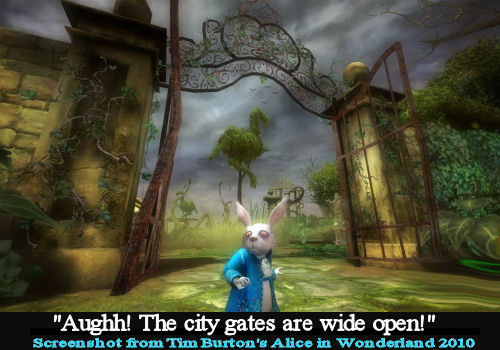
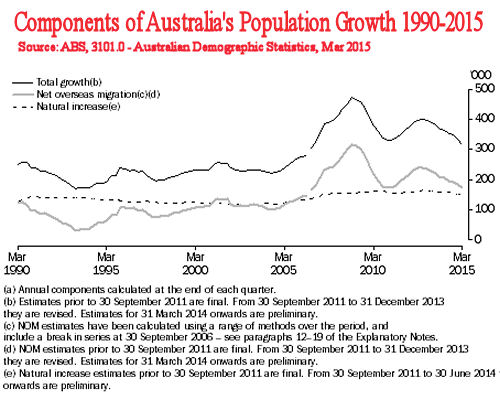
 These problems particularly concern viewing RT New and Press.tv.ir. For several days we have only been able to view those shows that have been republished on you tube. :-[ Our last problems with Telstra seemed to be fixed when we rewired around the 7th of Octobe. But now they are back again. Is anyone else having problems accessing RT or Iranian Press TV? End of article, don't bother to click on link.
These problems particularly concern viewing RT New and Press.tv.ir. For several days we have only been able to view those shows that have been republished on you tube. :-[ Our last problems with Telstra seemed to be fixed when we rewired around the 7th of Octobe. But now they are back again. Is anyone else having problems accessing RT or Iranian Press TV? End of article, don't bother to click on link.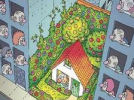 Jeff Dorset has begun a campaign addressed to the Prime Minister to reduce Australia`s economic, non refugee immigration intake to economically.environmentally and socially responsible level of 50,000 net pa and significantly reduce 457 Visa and other foreign worker import program. Please consider signing it.
Jeff Dorset has begun a campaign addressed to the Prime Minister to reduce Australia`s economic, non refugee immigration intake to economically.environmentally and socially responsible level of 50,000 net pa and significantly reduce 457 Visa and other foreign worker import program. Please consider signing it.

 "Propaganda is most effective when our consent is engineered by those with a fine education - Oxford, Cambridge, Harvard, Columbia -- and with careers on the BBC, the Guardian, the New York Times, the Washington Post. These organisations are known as the liberal media. They present themselves as enlightened, progressive tribunes of the moral zeitgeist. They are anti-racist, pro-feminist and pro-LGBT. And they love war. While they speak up for feminism, they support rapacious wars that deny the rights of countless women, including the right to life." John Pilger.
"Propaganda is most effective when our consent is engineered by those with a fine education - Oxford, Cambridge, Harvard, Columbia -- and with careers on the BBC, the Guardian, the New York Times, the Washington Post. These organisations are known as the liberal media. They present themselves as enlightened, progressive tribunes of the moral zeitgeist. They are anti-racist, pro-feminist and pro-LGBT. And they love war. While they speak up for feminism, they support rapacious wars that deny the rights of countless women, including the right to life." John Pilger. 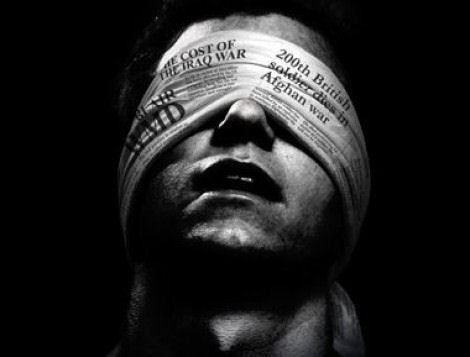
 Artist Mariette Perrinjaquet, in her latest exhibition 3-16th November at Chapel on Station Gallery, Box Hill, Victoria explores the origins and the mystery of life and our place as humans within this. In her statement she acknowledges the unknowable but expresses the certainty that whether life came about by accident or if it has meaning we are nonetheless part of it with each individual having the power to contribute even in the face of enormous ecological challenges.
Artist Mariette Perrinjaquet, in her latest exhibition 3-16th November at Chapel on Station Gallery, Box Hill, Victoria explores the origins and the mystery of life and our place as humans within this. In her statement she acknowledges the unknowable but expresses the certainty that whether life came about by accident or if it has meaning we are nonetheless part of it with each individual having the power to contribute even in the face of enormous ecological challenges.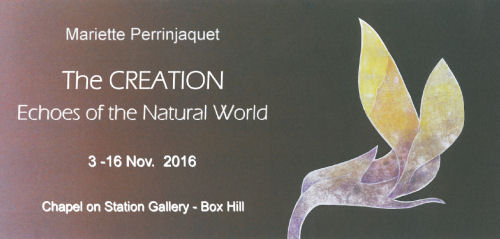
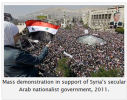 Apparently, the US Left has yet to figure out that Washington doesn’t try to overthrow neoliberals. If Syrian President Bashar al-Assad were a devotee of the Washington Consensus–as Counterpunch’s Eric Draitser seems to believe–the United States government wouldn’t have been calling since 2003 for Assad to step down. Nor would it be overseeing the Islamist guerilla war against his government; it would be protecting him.
Apparently, the US Left has yet to figure out that Washington doesn’t try to overthrow neoliberals. If Syrian President Bashar al-Assad were a devotee of the Washington Consensus–as Counterpunch’s Eric Draitser seems to believe–the United States government wouldn’t have been calling since 2003 for Assad to step down. Nor would it be overseeing the Islamist guerilla war against his government; it would be protecting him.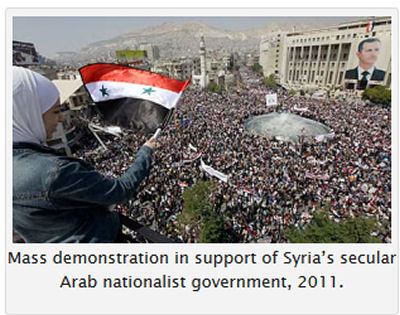
 A U.K. based company that has provided voting machines for 16 states, including important battleground states like Florida and Arizona, has direct ties with billionaire leftist and Clinton crusader George Soros.
A U.K. based company that has provided voting machines for 16 states, including important battleground states like Florida and Arizona, has direct ties with billionaire leftist and Clinton crusader George Soros.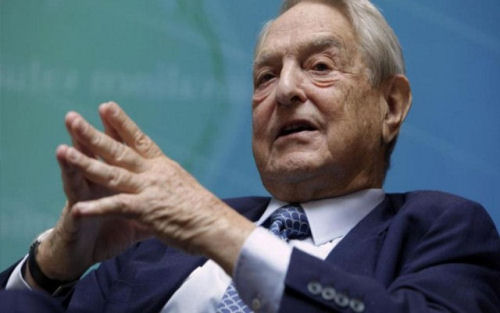

 According to journalist Robert Parry, "As polls show Hillary Clinton closing in on victory, Official Washington’s neoconservative (and liberal-hawk) foreign policy establishment is rubbing its hands in anticipation of more war and more strife, including a U.S. military escalation in Syria, a take-down of Iran, and a showdown with nuclear-armed Russia." Doesn't this bother anyone else but me?
According to journalist Robert Parry, "As polls show Hillary Clinton closing in on victory, Official Washington’s neoconservative (and liberal-hawk) foreign policy establishment is rubbing its hands in anticipation of more war and more strife, including a U.S. military escalation in Syria, a take-down of Iran, and a showdown with nuclear-armed Russia." Doesn't this bother anyone else but me?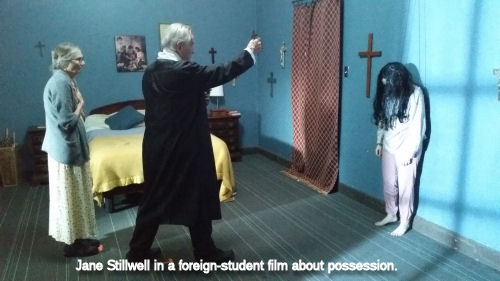 The future PrezClint2: Four more years of smirking...
The future PrezClint2: Four more years of smirking...
 Photoessay by Jill Quirk. Protest 6.45 am; Location: Beaumaris Secondary School, Reserve Road, Between Gramatan Avenue and Balcombe Road, Beaumaris. Wear red to show anger. Today I took photographs of the scene at Beaumaris Secondary College where 229 trees are scheduled for the chop tomorrow morning at 6.45 a.m. The area is fenced off as a demolition and building site. It looked to me as though a lot of vegetation if not trees has already been cleared and as though a couple of exhibits will be left in isolation for aesthetic purposes as solitary reminders of nature. I’m sorry for the displaced wildlife, especially possums who will no doubt find their way into the gardens of unwelcoming residents. One of the notices on the fence said that they want a new school but retaining as many trees as possible. Who is the new school for ? Current residents or for a large expected influx from overseas?
Photoessay by Jill Quirk. Protest 6.45 am; Location: Beaumaris Secondary School, Reserve Road, Between Gramatan Avenue and Balcombe Road, Beaumaris. Wear red to show anger. Today I took photographs of the scene at Beaumaris Secondary College where 229 trees are scheduled for the chop tomorrow morning at 6.45 a.m. The area is fenced off as a demolition and building site. It looked to me as though a lot of vegetation if not trees has already been cleared and as though a couple of exhibits will be left in isolation for aesthetic purposes as solitary reminders of nature. I’m sorry for the displaced wildlife, especially possums who will no doubt find their way into the gardens of unwelcoming residents. One of the notices on the fence said that they want a new school but retaining as many trees as possible. Who is the new school for ? Current residents or for a large expected influx from overseas?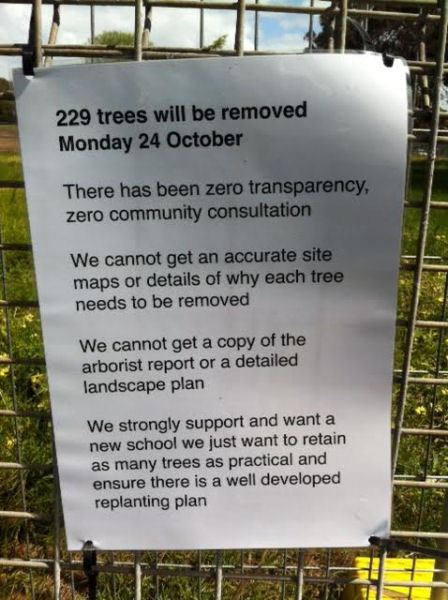
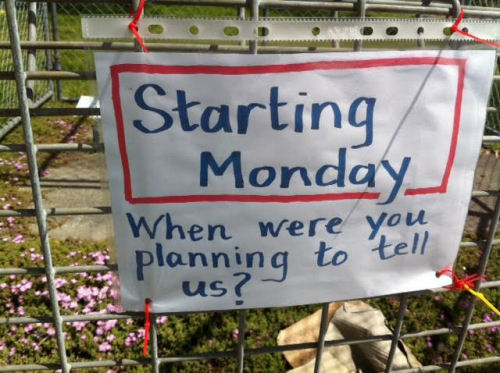
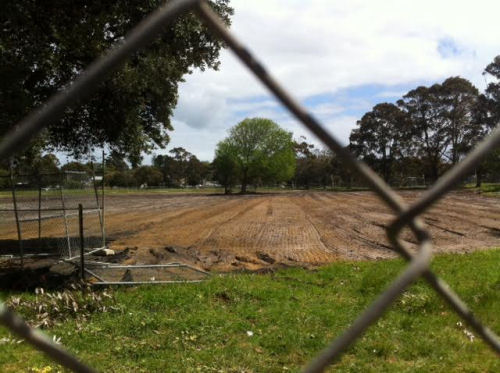

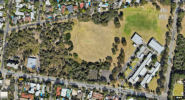 Citizens wearing red - to show anger - at the school site at 6:45 a.m. on Monday, 24 October 2016 will deplore the 229 trees' axing, after Government's secretive, anti-environment prelude to its attack. The State Government knew full well that all of Victoria’s municipal councils would be in caretaker mode when they arranged the present scheme for removing the 229 trees proposed. In that mode, the Council could not take out an injunction. The term of all Bayside City councillors ends today, at the declaration of the poll. The new Council cannot act until it first meets and its councillors have taken the oath, or affirmation, of office. It seems the deadline for lodging an application for that was 2:00 pm yesterday. The work is scheduled to start at 6:45 am on Monday. The Beaumaris Conservation society has a
Citizens wearing red - to show anger - at the school site at 6:45 a.m. on Monday, 24 October 2016 will deplore the 229 trees' axing, after Government's secretive, anti-environment prelude to its attack. The State Government knew full well that all of Victoria’s municipal councils would be in caretaker mode when they arranged the present scheme for removing the 229 trees proposed. In that mode, the Council could not take out an injunction. The term of all Bayside City councillors ends today, at the declaration of the poll. The new Council cannot act until it first meets and its councillors have taken the oath, or affirmation, of office. It seems the deadline for lodging an application for that was 2:00 pm yesterday. The work is scheduled to start at 6:45 am on Monday. The Beaumaris Conservation society has a 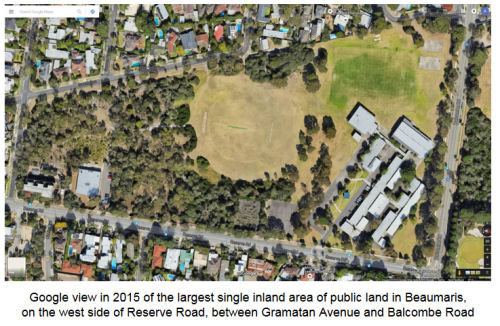
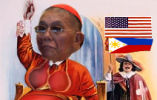 President Marcos institutionalized a national family planning program by creating a Population Commission (POPCOM) to study the issue and advise on a national policy. The focus of the commission was to decelerate the nation’s high fertility rates, yet consensus on how this was to be accomplished was considered problematic and, at best, unclear. Catholic sociologists brought an increased awareness of population problems and RCC officials started to become involved in the government birth control plan, making no objections and even sat on the POPCOM board. Obviously this concensus did not last. What happened?
President Marcos institutionalized a national family planning program by creating a Population Commission (POPCOM) to study the issue and advise on a national policy. The focus of the commission was to decelerate the nation’s high fertility rates, yet consensus on how this was to be accomplished was considered problematic and, at best, unclear. Catholic sociologists brought an increased awareness of population problems and RCC officials started to become involved in the government birth control plan, making no objections and even sat on the POPCOM board. Obviously this concensus did not last. What happened?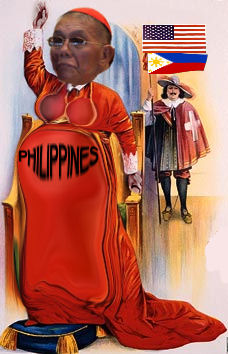
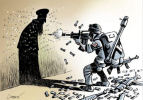 The absurdity of Australian news reporting on Syria would be funny if it were not for the disastrous consequences of such reporting for the people of Syria. I happened to see the end of a report from Matt Brown on 7.30 Report on the subject of chemical weapons in Syria. If it depresses me, think how the Syrians feel about our mindless repetition of war-crimes propaganda against Syria's army when that army is the only thing protecting most Syrians from foreign-backed terrorists.
The absurdity of Australian news reporting on Syria would be funny if it were not for the disastrous consequences of such reporting for the people of Syria. I happened to see the end of a report from Matt Brown on 7.30 Report on the subject of chemical weapons in Syria. If it depresses me, think how the Syrians feel about our mindless repetition of war-crimes propaganda against Syria's army when that army is the only thing protecting most Syrians from foreign-backed terrorists.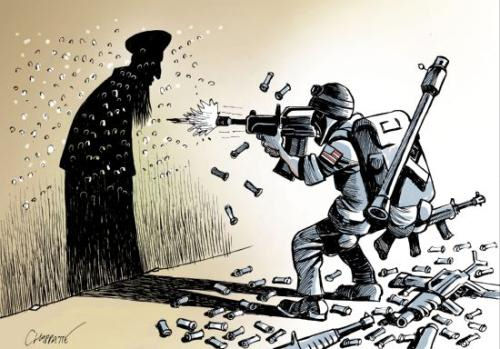
 During an interview on 19 October 2016 with Swiss TV SRF 1 TV Live, President Bashar al-Assad stressed that protecting civilians in Aleppo necessitates getting rid of the terrorists. He said, “Of course, it’s our mission according to the constitution and the law. We have to protect the people, and we have to get rid of those terrorists in Aleppo. That’s how we can protect civilians.” He added that it goes without saying that the way to protect the civilians in Aleppo is to attack the terrorists who hold the civilians under their control and are killing them. Full transcript inside:
During an interview on 19 October 2016 with Swiss TV SRF 1 TV Live, President Bashar al-Assad stressed that protecting civilians in Aleppo necessitates getting rid of the terrorists. He said, “Of course, it’s our mission according to the constitution and the law. We have to protect the people, and we have to get rid of those terrorists in Aleppo. That’s how we can protect civilians.” He added that it goes without saying that the way to protect the civilians in Aleppo is to attack the terrorists who hold the civilians under their control and are killing them. Full transcript inside:
 Little-known habits of the iconic native animal illustrated on Australia’s five cent coin have been unveiled in new research led by the University of the Sunshine Coast. A study led by USC Lecturer in Animal Ecophysiology Dr Christofer Clemente has offered new clues to the movement habits of the short-beaked echidna. One of the findings, published today in an article on ‘The private life of echidnas’ in the Journal of Experimental Biology, is that each animal could be responsible for aerating up to 200 cubic metres of soil each year – a function critical for soil nutrition.
Little-known habits of the iconic native animal illustrated on Australia’s five cent coin have been unveiled in new research led by the University of the Sunshine Coast. A study led by USC Lecturer in Animal Ecophysiology Dr Christofer Clemente has offered new clues to the movement habits of the short-beaked echidna. One of the findings, published today in an article on ‘The private life of echidnas’ in the Journal of Experimental Biology, is that each animal could be responsible for aerating up to 200 cubic metres of soil each year – a function critical for soil nutrition.

 People will be interested to see this interview with the Syrian president's wife, someone we do not often hear about in western media because she looks and sounds too good to suit its propaganda. In March 2011, Vogue magazine called Asma' al-Assad (née al-Akhras) "A Rose in the Desert". The same magazine smeared her years later as the wife of a war criminal. Asma' al-Assad has an English accent and British citizenship because she born and lived in England. Dr Bashar al Assad, now the president of Syria, met her when he was studying eye medicine in London in the 90's, and married her after he became the president. She was at the time contemplating going to Harvard as a post grad in banking finance. She drives alone in dangerous areas of Syria, meeting widows and orphans of the war, and the mothers of soldiers killed in action (known as 'martyrs' in Syria). She describes in detail the problems of injured soldiers and how she tries to assist. Her children attend school in Syria. She says she has received offers to leave Syria with her three children to a safer area (Gulf, Europe...) with her income guaranteed, but she did not think that would help Syria and she recognised these offers as a trick to undermine Syrian morale. Arabic MSM of the Gulf has carried many false rumors about the Assad family fleeing to Iran and Russia, meeting Russian submarines in the Mediterranean, that the Assads are divorcing, that their children hate them etc. Asma' al-Assad notes the biased treatment of displaced and wounded children in Syria in its almost exclusive reporting only of those who are in the areas occupied by the so-called 'rebels', ignoring the many deaths of soldiers in the Syrian Arab Army and that the majority of Syrians live in government held areas that the so-called 'rebels' constantly target.
People will be interested to see this interview with the Syrian president's wife, someone we do not often hear about in western media because she looks and sounds too good to suit its propaganda. In March 2011, Vogue magazine called Asma' al-Assad (née al-Akhras) "A Rose in the Desert". The same magazine smeared her years later as the wife of a war criminal. Asma' al-Assad has an English accent and British citizenship because she born and lived in England. Dr Bashar al Assad, now the president of Syria, met her when he was studying eye medicine in London in the 90's, and married her after he became the president. She was at the time contemplating going to Harvard as a post grad in banking finance. She drives alone in dangerous areas of Syria, meeting widows and orphans of the war, and the mothers of soldiers killed in action (known as 'martyrs' in Syria). She describes in detail the problems of injured soldiers and how she tries to assist. Her children attend school in Syria. She says she has received offers to leave Syria with her three children to a safer area (Gulf, Europe...) with her income guaranteed, but she did not think that would help Syria and she recognised these offers as a trick to undermine Syrian morale. Arabic MSM of the Gulf has carried many false rumors about the Assad family fleeing to Iran and Russia, meeting Russian submarines in the Mediterranean, that the Assads are divorcing, that their children hate them etc. Asma' al-Assad notes the biased treatment of displaced and wounded children in Syria in its almost exclusive reporting only of those who are in the areas occupied by the so-called 'rebels', ignoring the many deaths of soldiers in the Syrian Arab Army and that the majority of Syrians live in government held areas that the so-called 'rebels' constantly target.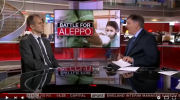 Dr Marcus Papadopoulos was interviewed by BBC News about 'russophobia' in Britain and policy in Syria . Speaking very clearly, Papadopoulos gives a history of British resentment of Russia, dating from the Crimea and thinks that Britain is acting in part out of a feeling of being left-out in the region. Islamist terrorists in Aleppo and elsewhere in Syria are the only ones benefiting from this British ignorance and bias. It should be remembered that those Islamic terrorists that the west is backing, pose a huge threat to the people of Britain. The US-led coalition in Syria is not acting legally.
Dr Marcus Papadopoulos was interviewed by BBC News about 'russophobia' in Britain and policy in Syria . Speaking very clearly, Papadopoulos gives a history of British resentment of Russia, dating from the Crimea and thinks that Britain is acting in part out of a feeling of being left-out in the region. Islamist terrorists in Aleppo and elsewhere in Syria are the only ones benefiting from this British ignorance and bias. It should be remembered that those Islamic terrorists that the west is backing, pose a huge threat to the people of Britain. The US-led coalition in Syria is not acting legally.
Recent comments